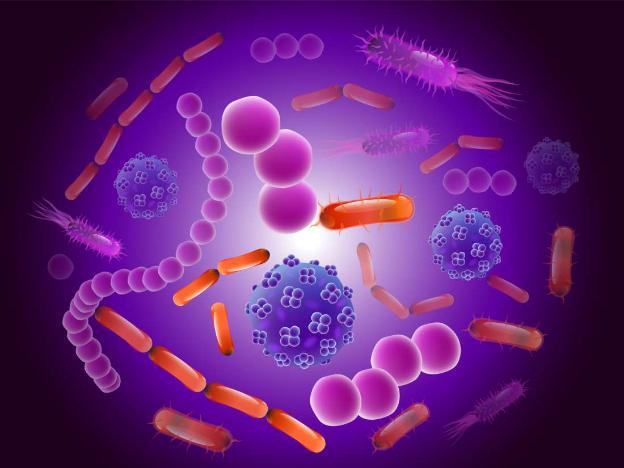7 signs “indicating” an unhealthy gut-Life Health
Gut health plays a very important role, greatly affecting the health of the entire body. When the gut is not healthy, it will affect the immune system and contribute to many diseases …
1.The role of the gut microbiota
Gut microbiota refers specifically to the microorganisms that live in the body’s intestines. A person has about 300 to 500 different species of bacteria in their digestive tract. While some microorganisms are harmful to health, many are beneficial and even necessary for a healthy body.
Having many of these good bacteria in the gut can boost immune system function, improve symptoms, and improve symptoms depressionhelps fight obesity and brings many other health benefits…
2. Signs of an unhealthy gut
There are many factors that affect the gut microbiome such as: Stress, too little sleep, eating a lot of processed foods and high in sugar, taking antibiotics… This can affect other aspects. health, such as brain, heart, immune system, skin, weight, hormone levels, nutrient absorption and even cancer growth.

There are about 300 to 500 different species of bacteria in the digestive tract
Here are the seven most common signs of an unhealthy gut:
2.1 Stomach bloating
A healthy gut will help digest food well and eliminate waste. Stomach upsets like bloating, gas, constipation, diarrhea and heartburn can all be signs of an unhealthy gut.
2.2 Craving for sugar
A diet high in processed foods and high in sugar can reduce the number of good bacteria in the gut. This imbalance can increase sugar cravings, which can further harm the gut.
High amounts of refined sugar, especially high-fructose corn syrup, can increase inflammation in the body. Inflammation can be a precursor to several diseases and even cancer.
2.3 Unintentional weight changes
Weight gain or loss that is unrelated to your diet or exercise routine can be a sign of an unhealthy gut. An imbalanced gut impairs the body’s ability to absorb nutrients, regulate blood sugar, and store fat.
Weight loss can be caused by bacteria in the small intestine overgrowth (SIBO), while weight gain can be caused by insulin resistance or overeating due to decreased absorption of nutrients.
2.4 Sleep disturbances or persistent fatigue
An unhealthy gut can contribute to sleep disorders like insomnia or poor sleep and thus lead to chronic fatigue. Much of the body’s serotonin (a hormone that affects mood and sleep) is produced in the gut. So gut damage can impair your ability to sleep well. Certain sleep disorders have also been linked to fibromyalgia risk.

Sleep disturbance warns the gut is not healthy
2.5 Skin irritation
Skin conditions such as eczema can be associated with a damaged gut. Inflammatory bowel disease caused by poor diet or food allergies… can irritate the skin and cause conditions like eczema.
2.6 Development of autoimmune diseases
Scientists are constantly finding new evidence about the impact of the gut on the immune system. An unhealthy gut can increase systemic inflammation and alter the normal functioning of the immune system. This can lead to autoimmune diseases (the system’s immune response against its own healthy cells and tissues).
2.7 Food intolerance
A food intolerance is the result of difficulty digesting certain foods (this is different from a food allergy, which is caused by the immune system’s response to certain foods). It is thought that food intolerance can be caused by the poor quality of bacteria in the gut, which can lead to difficulty digesting food and unpleasant symptoms such as gas, bloating, diarrhea, abdominal pain. and nausea. There is some evidence that food allergies may also be related to gut health.
3. Measures for improvement
3.1 Reduce your stress level
Chronic, high stress levels affect the entire body, including the gut. Some ways to reduce stress can include meditation, walking, getting a massage, spending time with friends or family, diffusing essential oils, reducing caffeine intake, laughing, yoga, or having a pet.

Meditation can help reduce stress
3.2 Get enough sleep
Insufficient or poor quality sleep can seriously affect gut health. An unhealthy gut also causes many sleep problems. Try to make it a priority to get at least 7-8 hours of sleep each night.
3.3 Eat slowly
Eating slowly and chewing food thoroughly can help promote proper digestion and absorption of nutrients. This can help you reduce digestive discomfort and maintain a healthy gut.
3.4 Provide enough water
Drinking plenty of water has been shown to have beneficial effects on the lining of the intestines, as well as the balance of good bacteria in the gut. Staying hydrated is a simple way to promote a healthy gut.
3.5 Prebiotic or probiotic supplement
Adding prebiotics or probiotics to your diet can be a great way to improve gut health. Prebiotics provide “food” that promotes the growth of beneficial bacteria in the gut, while probiotics are live beneficial bacteria.
However, people with bacterial overgrowth, such as SIBO, should not take probiotics. Since not all probiotic supplements can be beneficial for everyone, you should consult your doctor when choosing a probiotic or prebiotic supplement to ensure the benefits. best health.
3.6 Change of diet
Reducing the amount of processed, high-sugar and high-fat foods you eat can contribute to improved gut health. Additionally, eating more plant-based foods and lean proteins can have a positive impact on the gut. Diets high in fiber have been shown to contribute greatly to a healthy gut microbiome.
4. Foods that are good for gut health

Foods rich in fiber for gut health
Diet and gut health are closely linked. Avoiding processed foods, high-fat foods, and foods high in refined sugars is extremely important for maintaining a healthy microbiome, as these foods destroy good bacteria and promote growth. growth of harmful bacteria.
There are also certain foods you can eat that have a positive effect on promoting the growth of beneficial bacteria, which contributes to your overall health.
These foods include:
4.1 Foods rich in fiber
Fiber-rich foods like legumes, peas, oats, bananas, berries, asparagus, and leeks have been shown to have a positive impact on gut health.
4.2 Fermented foods
Fermented foods like kimchi, sauerkraut, yogurt, tempeh, miso, and kefir are excellent sources of probiotics. While the quality of these foods can vary, their benefits to the gut microbiome are remarkable.
at Blogtuan.info – Source: 24h.com.vn – Read the original article here



